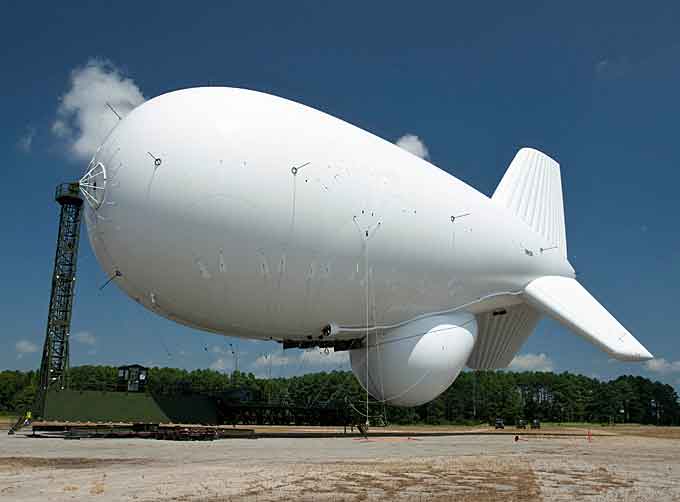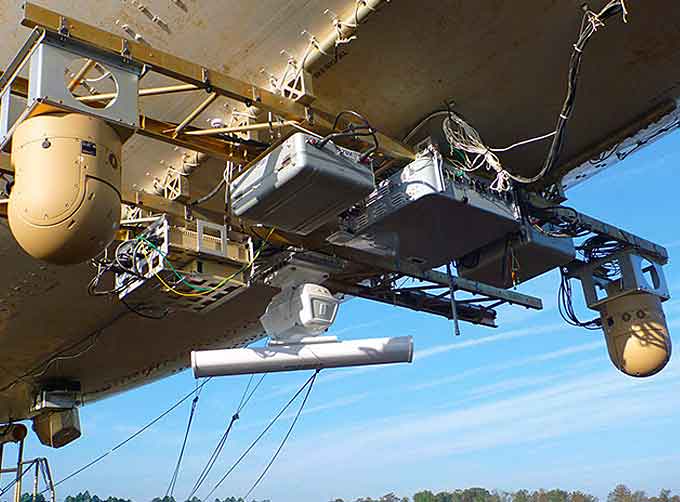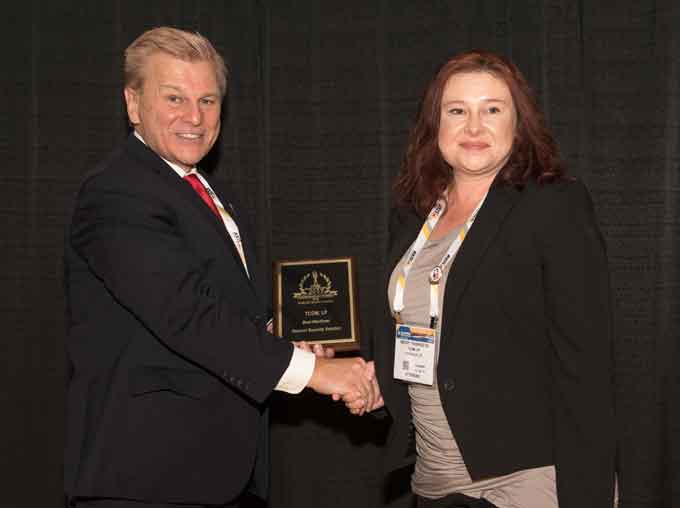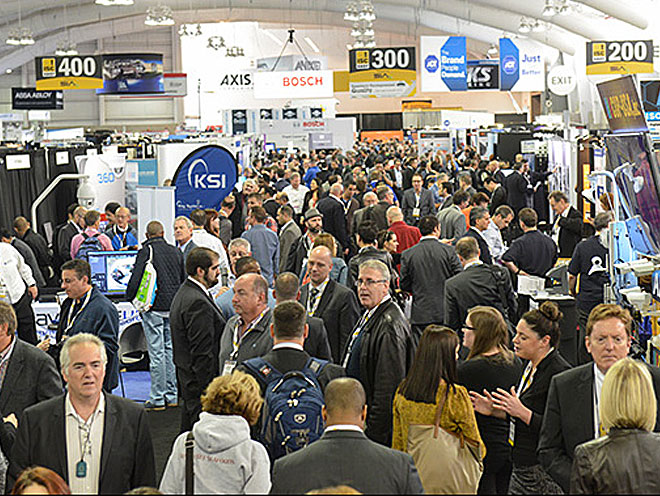
Guest Op-Ed By Matt McNiel, TCOM, L.P.
Unmanned aerial systems (UAS or, more colloquially, drones) are tremendously useful military assets capable of a variety of non-military applications – from monitoring hurricanes to surveying flood and wildfire damage.
Despite their proliferation and ubiquity, there remains room for one unmanned airborne system that predates even manned powered flight – Aerostats.
Aerostats are lighter-than-air systems that use gases like helium to become airborne without lift-inducing wings or propulsive thrust.
From their elevated perspective, governments and other operators can effectively and efficiently monitor thousands of square miles of land, sea and air.
During the more than 150 years since the inception of Aerostats, no one has invented a lower-cost platform to provide persistent aerial surveillance.
Aerostats stay aloft for weeks at a time, with minimal cost, crew and maintenance, backed up by manned aircraft and drones only when necessary.
(See a brief video where TCOM showcases their platforms and describes features, functionality and capabilities, of TCOM Aerostats in ‘Soldiers of the Sky.’ Courtesy of TCOM LP and YouTube. Posted on Jan 3, 2018.)
Now more than ever, Aerostats are often better suited for long-endurance surveillance missions as a single Aerostat can stay on-station 24 hours a day / 7 day a week for weeks at a time with very minimal down-time for maintenance.
Aircrafts and drones for example are more expensive to operate, and their on-station duration is measured in hours, not days.
Aerostats are almost always more cost efficient to operate than any other airborne assets and are resilient to weather which has been proven by decades of operations amid harsh environmental conditions that would prevent the use of manned or unmanned aircraft.
They are a critical node on the battlefield network or theatre of operations and offer tremendous surveillance and other capabilities to non-military governmental and commercial operators as well.
Operating together as a complex system of systems, aircrafts and drones are made more effective by the presence and participation of Aerostats.
For decades, Aerostats have monitored the southern US border to help combat illegal immigration and drug trafficking.
(The TCOM 17M and 22M aerostat systems provide versatile, battle-proven, rapid deployment, persistent surveillance. Equipped to detect and track targets even in the most challenging terrain, the TCOM 17M and 22M aerostats are compact yet powerful solutions for inland and maritime border surveillance applications. Courtesy of TCOM LP and YouTube.)
Their persistent presence provides a deterrent effect not seen with other airborne surveillance platforms; in the Southwest, smuggling attempts by small planes have been virtually eliminated, and in the Caribbean, smuggling by “go-fast” boats has been sharply curtailed.
In many cases, the mere presence of Aerostats has greatly influenced the actions of smugglers, who have quickly changed, relocated or ceased their illicit activities altogether.
They are well aware that Aerostats carry highly-effective intelligence-gathering sensors and that if their smuggling attempts are seen then they will be quickly intercepted by manned or unmanned aircraft.
Aerostats are proven platforms that readily accept innovative technologies which allow them to remain at the forefront of persistent surveillance as new passive and active electronic sensors become available.
Aerostats afford a more simplified integration effort for these new ISR sensors and other technologies, avoiding the lengthy and expensive airworthiness certification efforts necessary to fly new sensors on manned and unmanned aircraft.

Aerostats are the ideal airborne testbed to prove the value of, and work out any issues with, new technologies as they become available.
TCOM, L.P. produces the largest Aerostats to date, varying from 12 meters to over 117 meters in length.
They can be assembled and deployed by minimal crew in just hours, and operated from either land or vessels at sea.
These Aerostats can carry a variety of sophisticated payloads including day/night Electro-Optics/Infrared (EO/IR) Cameras, Radars, Signals Intelligence (SIGINT), Communications Relays and more.
TCOM was the first to use laminate materials in Aerostat fabrics and the first to use fiber-optic powered tether systems and tethers that double as low frequency communications antennas, and is the only company to deploy an Aerostat to altitudes above 20,000 feet.
TCOM Aerostats have been used as part of the longest ongoing Aerostat surveillance operations.
Additionally, TCOM supplies Aerostats to the Philippines which seek to deploy them for maritime security and maritime safety – including the persistent tracking of fishing vessels to reduce search time when rescue missions are required.
(TCOM LP Operational Class Aerostat Systems ideal for maritime and border surveillance. Their complete platform solutions include numerous classes of aerostats that can each be equipped with a broad selection of proven payloads that are customizable for specific customer requirements. Courtesy of TCOM LP and YouTube.)
New Zealand similarly is looking at how Aerostats can bolster its national defense and help protect its natural resources by combatting illegal fishing in the Southern Ocean and Antarctic.
TCOM Aerostats have also been used to rebroadcast radio and TV signals, which have proven very helpful to civil authorities in the wake of widespread natural disasters like hurricanes that knock-out transmission towers.
Modern Aerostats have a proven track record of 45 years and millions of airborne hours providing persistent surveillance in austere environments.
A July 2018 study[1] suggests the global Aerostat market will continue to grow at double-digit rates through at least 2023 due to military and commercial customers who want low-cost, persistent surveillance.
Only perhaps geo-synchronous satellites can provide similar persistence, but their total acquisition and operational costs are orders of magnitude greater than that of an Aerostat solution.
Aerostats are here to stay, and their adoption and use is growing as operators and innovators continue to find new uses for these reliable platforms.
About the Author:

Matt McNiel serves as Vice President, of Global Business Development- ISR Solutions at TCOM, L.P.
A proven leader and business executive with over 20 years of experience in Global and Domestic Aerospace & Defense industry, Matt has a focus on innovative Intelligence, Surveillance & Reconnaissance (ISR) solutions.
Matt currently oversees executive business development for international opportunities in ISR persistent surveillance in lighter than air technologies such as tactical, operational and strategic aerostat solutions.
With proven expertise extending to program management, integrated product teams, and earned value management, Matt is experienced in international business experience in the Middle East, Asia, Africa, Latin and South America and with all associated import/export compliance, including International Traffic in Arms Regulations.
[1] “Aerostat Market to Grow at CAGR of over 13% during 2017-2023,” Market Research Future, 24 July 2018.
TCOM, LP Named a Finalist in 2018 ‘ASTORS’ Homeland Security Awards Program
AST focuses on Homeland Security and Public Safety Breaking News, the Newest Initiatives and Hottest Technologies in Physical & IT Security, essential to meeting today’s growing security challenges.
The 2018 ‘ASTORS’ Homeland Security Awards Program, is organized to recognize the most distinguished vendors of Physical, IT, Port Security, Law Enforcement, Border Security, First Responders, (Fire, EMT, Military, Support Services Vets, SBA, Medical Tech) as well as the Federal, State, County and Municipal Government Agencies – to acknowledge their outstanding efforts to ‘Keep our Nation Secure, One City at a Time.’
As an ‘ASTORS’ competitor, TCOM is competing against the industry’s leading providers of Innovative Long Range Persistent Surveillance Solutions.
To Learn More about the ‘ASTORS’ Homeland Security Awards Program, see 2017 ‘ASTORS’ Homeland Security Award Winners Honored at ISC East.

Over 100 distinguished guests from National, State and Local Governments, and Industry Leading Corporate Executives from companies allied to Government, gathered from across North America and the Middle East to be honored from disciplines across the Security Industry in their respective fields which included representatives from:
 The Department of Homeland Security(DHS) Science and Technology Directorate (S&T)
The Department of Homeland Security(DHS) Science and Technology Directorate (S&T)- U.S. Customs and Border Protection
- The Department of Justice
- The Security Exchange Commission
- State and Municipal Law Enforcement Agencies
- The Royal Canadian Mounted Police
- Leaders in Private Security
Good luck to TCOM, LP on becoming a Winner of the 2017 American Security Today’s Homeland Security Awards Program!
To Learn More, about TCOM’s cost-effective lighter-than-air surveillance solutions, please visit http://www.tcomlp.com.

The highlight of the 2018 AST Homeland Security Awards Season will be the 2018 ‘ASTORS’ Awards Presentation Luncheon to honor Nominees, Finalists and Winners on November 14, 2018 at ISC East 2018 at the Jacob Javits Exhibition Center.
Join us in Recognizing these Industry-Leading Firms for their Outstanding Product Development Achievements, Exciting New Technologies and Innovative Education Programs to address the growing Homeland Security Threats our Nation is facing.

Take advantage of this exclusive luncheon opportunity to Invite your Guests, Clients and Show Visitors to a lovely & affordable plated meal event in the heart of New York City, for a Fabulous Networking Opportunity!
ISC East is the Northeast’s largest security industry event and your ‘ASTORS’ Awards Luncheon registration includes complimentary attendee access to the show.
Already Exhibiting and/or Attending the 2018 ISC East Conference?
Join us to meet the 2018 ‘ASTORS’ Award Winning Company Executives & Government Agency Representatives.
Register today for the ‘ASTORS’ Homeland Security Awards Luncheon on November 14th, in New York City and give yourself & your clients a break from the show!
Gourmet luncheon choices available per person, or reserve a table – make an Impression on your Guests and Receive an Exclusive Discount Opportunity.



















